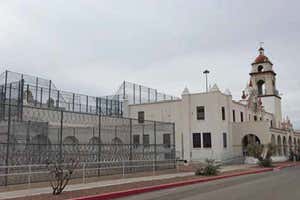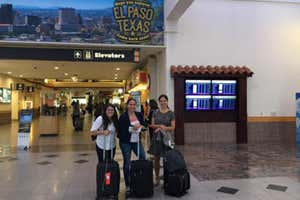Pro Bono Spotlight

MoFo Pro Bono Teams Reconnect Separated Families and Counsel Detained Immigrants
Morrison & Foerster received an urgent message in August from the Immigration Justice Campaign seeking volunteer Spanish-speaking lawyers to travel to El Paso, Texas, to assist with the crisis resulting from the federal government’s decision to try to discourage family migration from Central America by separating parents and children. MoFo lawyers responded to the call.
Thus far, those lawyers have reunited several children with their parents, arranged for communication between a father and son who hadn’t spoken in months as a result of their detention, and prepared numerous detainees for possible credible fear interviews (CFIs) or reasonable fear interviews (RFIs) that will determine their ability to pursue asylum in the United States.

Reuniting Families
Flying into Texas and Georgia, Alexis Amezcua, Lauren Bennett, Justin Fisch, Andrew Kissner, Julian Radzinschi, Erica Richards, and Claudia Vetesi visited detention centers in some of the most remote and desolate areas in the United States.

For Alexis, a MoFo litigation partner based in San Francisco, the effort included sitting for hours in a rental car in a parking lot outside the Otero County Detention Center in New Mexico in temperatures hovering around 100° Fahrenheit. From that car, she tried to effect the reunification of a Guatemalan detainee named Jorge with his 14-year-old daughter, Nely, using only her MoFo Wi-Fi hotspot and her cell phone.
Alexis, her fellow litigation partner Claudia, and Lauren, an associate, had driven to New Mexico after flying into El Paso, Texas, to meet with detainees who they and other members of the MoFo team would represent.
The mother of two very young girls herself, Alexis describes how daunting it was having Jorge’s reunification with his barely teenaged daughter riding on Alexis’s ability to reach the right person in an intensely bureaucratic system.
“I was knocking on the doors of offices at that New Mexico detention center, trying to get more information about whom I should be calling. It felt like I was being passed from bureaucrat to bureaucrat,” Alexis says, adding that she had to arrange for communication between Immigration and Customs Enforcement (ICE), which was responsible for detaining Jorge, and the Department of Health & Human Services, the agency responsible for Nely’s detention at a children’s facility in Florida.
The whole situation was further complicated by the fact that Alexis had to advocate for her client over the phone. “But I was like a dog with a bone, a tenacious mother who was not going to stop until I got somebody on the line to commit to a date and time when Jorge and Nely would be reunited,” she says. Alexis achieved her goal, arranging for the father and daughter to be reunified within the week at Annunciation House, an El Paso immigration services agency.
Within hours of their arrival in El Paso, Alexis, Lauren, and Claudia also arranged for another Guatemalan detainee, Jose, who was being held at a detention center in West Texas, to speak with his son Mateo, who was in a center for detained immigrant children in Florida. The two had not spoken in months.
New York associate Andrew Kissner, who initially supported the effort to help Jose from afar, traveled to El Paso in September for a follow-up visit. Andrew represented Jose at an asylum hearing; sadly, asylum was denied and it looks as though Jose will be deported soon. His son is still pursuing an asylum case however.
Just before Andrew’s trip, New York associate Julian Radzinschi also traveled to El Paso to meet with a new client who had been detained in Texas since June while that client’s five-year-old daughter was being held in a New York shelter. “My client was supposed to be reunified in mid-July,” Julian explains. “But the government is quite slow when it comes down to effecting these reunifications. I spoke at length to ICE and to other bureaucrats to try and push the reunification forward, but they find ways to pass responsibility off to someone else,” he says, echoing Alexis’s frustration.
While Julian was in El Paso, supervising attorney Ruti Smithline attended an immigration court hearing for the child in New York and made contact with the legal services organization that was assisting the child. On October 5, after weeks of Julian’s tenacious advocacy — the legal services organization fondly described him as a “zealous and kind mosquito” — Julian’s and Ruti’s clients were reunited and the two are now living in Tennessee.
Counseling Detainees
Not all of the MoFo lawyers who have taken on pro bono work with detainees have worked with individual clients. For example, Erica Richards, N.Y.-based counsel in the Business Restructuring and Insolvency Group, spent a week in June assisting individuals at an immigration detention center in a rural Georgia town.
“I was inspired by a presentation given at MoFo by the Immigration Justice Campaign and the Southern Poverty Law Center,” says Erica. “The presentation was in February, long before family separation was even an issue.” (The Morrison & Foerster Foundation helped to kick-start the Campaign with a donation of $10,000 in early 2017.)
Erica helped Southern Poverty Law Center staff lawyers with screening, initial intake, and motion drafting for bonds. Getting out on bond, Erica explains, can go a long way toward helping a detainee prevail on his or her immigration application.
“If they’re out on bond, they can work, make connections, look for an attorney (or help their attorney if they are lucky enough to have counsel), and do all the things that would support their application,” she explains. New York lawyers Chanwoo Park, Max Zidel, and Katie Viggiani prepared immigrant detainees at the Albany (N.Y.) County Correctional Facility for their CFIs with supervision from MoFo partner Jamie Levitt. Their efforts came about as a result of the Department of Homeland Security’s transfer of over 300 immigrant detainees from federal detention facilities at the U.S. border to the Albany County Correctional Facility. Most of the detainees were subject to the Trump administration’s zero tolerance policy of criminally prosecuting anyone who enters the United States other than at border checkpoints, and some of the detainees are parents whose children were separated from them while they await criminal prosecution.
In August, San Francisco associate Justin Fisch went down to El Paso, where he spent approximately 10 days meeting with about 40 parents to gather information that would help other pro bono lawyers individually represent those parents. Justin also prepared some of the detainees for possible CFI interviews. After being released, one of the parents with whom Justin worked said Justin’s visits had given him strength during his detention.
Justin relayed a heartbreaking story from one of the Guatemalan detainees he counseled.
“His daughter, who was four years old and can’t speak a word of Spanish — she spoke a Mayan language called Q’anjob’al — had been detained for three months at a place in Phoenix, Arizona, where nobody spoke her language. Just imagine that.” Justin observed, “The long-term repercussions of this policy remain to be seen.”